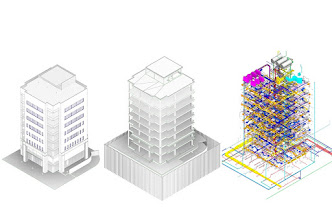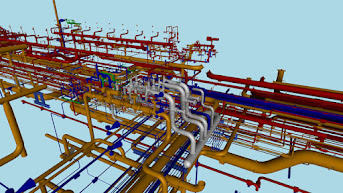The Importance of Facade Detailing Service in Building Design.
What is Facade Detailing?
In architectural design, facade detailing is all about organizing and selecting a building's external appearance and functionality. This covers elements such as exterior materials, elaborate embellishments or patterns, window and door placement, weatherproofing, and structural integrity.
Architects, engineers, and other professionals collaborate on facade detailing projects to ensure that a building's exterior is not only aesthetically pleasing but also long-lasting and safe. It's about making the structure both aesthetically pleasing and useful.
Here are the main parts of facade detailing:
- Choosing the right materials for the outside of the building, like bricks, metal, or glass. These materials need to be both tough and good-looking.
- Adding decorative stuff like designs, patterns, or special features to make the building look nicer.
- Figuring out where to put the windows and doors, and what they should be made of. Windows and doors are important for light, air, and how the building looks.
- Making sure the outside has what it needs to stay strong and protect the inside from bad weather. This might mean adding extra layers or materials for insulation.
- Designing the structure of the outside to make sure it can handle things like strong winds or earthquakes. This includes things like pillars and beams, and how they're connected to the rest of the building.
What is Facade Detailing services?
The careful planning, designing, and implementation of a building's facade's external look and structural components constitute facade detailing services. When it comes to weather protection, energy efficiency, and durability, these services are crucial for architects and builders to guarantee that a building's exterior not only looks good but also performs well.
Facade detailing encompasses a wide range of aspects, including:
- Exterior Materials and Finishes: Selecting the appropriate materials, colors, and finishes to create the desired look and feel of the building's exterior. This includes choices like brick, stone, glass, metal, wood, or composite materials.
- Architectural Ornamentation: Incorporating decorative elements such as moldings, cornices, columns, and other architectural features to enhance the building's visual appeal.
- Window and Door Design: Designing and placing windows and doors to optimize natural light, ventilation, and access, while also contributing to the overall aesthetics.
- Cladding and Insulation: Implementing cladding systems to protect the building from environmental factors and insulating it for energy efficiency and comfort.
- Structural Considerations: Ensuring the facade's structural integrity by considering factors like wind loads, seismic forces, and structural support systems.
Experts in facade details collaborate closely with builders, engineers, and architects to realize the design concept. In addition, they take into account pragmatic elements like resilience to weather, energy efficiency, control of moisture, safety, and adherence to building standards and guidelines.
Following are the The Importance of Facade Detailing Service in Building Design.
Building design includes the crucial component of facade detailing. It influences the way a building functions, appears, and works. It entails meticulous planning, designing, and construction of the building's exterior while keeping in mind both its aesthetics and functional requirements. Facade detailing is essential in building design for the following reasons:
Aesthetic Appeal:
An important factor in building design is its external appearance. When facades are well-designed, they enhance and distinguish the building's appearance. Services for facade detailing aid in the creation of imaginative and striking designs that complement the building's style and function while expressing the architect's vision.
Energy Efficiency:
Optimizing a building's exterior can significantly reduce its energy use. The structure may stop itself from getting too hot in the sun and retain heat inside during the cold by adding features like shading devices, insulation, and specific windows. As a result, the building uses less artificial lighting and heating, saving both money and energy.
Structural Integrity:
Services for facade detailing ensure that the building's outside is resilient to various weather conditions, including severe winds, deep snowfall, and earthquakes. In order for the facade to support the entire building and maintain its stability and safety, experts employ clever approaches in their analysis and design of the structure.
Weather Protection:
A building's exterior shields it from elements like wind, rain, snow, and intense sunlight. Proper detailing aids in selecting the appropriate building materials and techniques to protect the structure from inclement weather. This keeps air from leaking, water from penetrating, and severe weather from damaging the building.
Durability and Maintenance:
When designing a building's exterior, we consider long-term maintenance and what the structure will require to look nice. Experts ensure that the building's exterior remains sturdy and appealing for an extended period of time by utilizing high-quality materials and performing routine maintenance. In this manner, we may avoid frequently fixing or replacing it.
Compliance and Safety:
Adhering to regulations and safety criteria is crucial while building design. Services for facade detailing ensure that the structure complies with all applicable safety regulations and local laws. This involves putting in place fire safety precautions, ensuring the structure is structurally sound, and making it accessible to everyone. The individuals inside the building can remain secure and healthy in this way.
Why does building design matter?
Building design has a complex influence on building projects, making it of utmost importance. It simplifies the planning process, reducing errors and maximizing resource use, leading to enhanced productivity and significant cost savings through technologies like CAD and BIM services. Furthermore, sustainable elements can be included into well-designed buildings to lessen their impact on the environment through the use of eco-friendly materials, energy-efficient systems, and prudent resource management.
Apart from these benefits, practicality and aesthetics are essential. A building's aesthetic appeal is increased by facade detailing, which can increase its desirability and property value. Functional design, on the other hand, makes sure that interior elements and spaces are in line with the needs of the inhabitants, improving comfort and usability. In addition, adherence to local building laws and safety regulations is necessary to protect inhabitants and avoid legal problems. Last but not least, a structure with good design is likely to last longer and require less upkeep and remodeling over time. In conclusion, building design is essential since it affects cost, sustainability, longevity, efficiency, and aesthetics. BIM services, CAD, and facade details can help.
The crucial role of facade detailing?
Facade detailing plays a crucial role, especially when it comes to BIM services and CAD. Facades function as a building's protective shell in addition to being aesthetically pleasing. Exquisitely designed facades are essential for optimizing a building's energy efficiency, making sure that insulation is in place, and managing natural light, all of which have a big impact on how sustainable a structure is. With the use of CAD technology, exact design and detailing are made possible, guaranteeing that each component of the facade contributes to the overall aesthetic appeal of the structure while fulfilling a functional need.
Furthermore, it is essential that facade details be integrated into BIM systems. By facilitating the synchronization of different building components, BIM makes it possible to depict the facade in the broader building model in a comprehensive and precise manner. This connection helps with accurate material and cost estimation, expedites the design process, and enhances stakeholder involvement on the project. Builds that are not only aesthetically pleasing but also sustainable, energy-efficient, and sound functionally are largely dependent on well-executed facade detailing, which is bolstered by BIM services and CAD technology.
The role and skills of facade detailing experts:
Experts in facade detailing are vital members of the construction industry, in charge of planning and constructing buildings' exteriors. They are adept at using CAD and BIM software to produce intricate designs and incorporate them into larger construction models. These professionals are also knowledgeable about many types of façade materials and skilled in choosing the best ones to fulfill project specifications while taking energy efficiency, structural stability, and aesthetics into account.
In order to lessen a building's environmental effect, they also perform structural assessments, guarantee adherence to safety and building code requirements, and concentrate on energy-efficient design. Proficiency in communication and problem-solving techniques are vital when collaborating with diverse stakeholders and resolving any design or building obstacles that may emerge throughout a project.
Furthermore, specialists in façade detailing frequently take on project management responsibilities, supervising the building process and guaranteeing that the facade's component parts are put accurately and up to par. Their extensive skill set and meticulous attention to detail are crucial in producing building exteriors that are aesthetically pleasing, practical, safe, and energy-efficient while also adhering to architectural purpose.
In conclusion, it is crucial to pay attention to a building's outside. Buildings that receive facade detailing services operate more efficiently, last longer, and are safer. Professionals combine durable materials, energy-efficient technologies, and clever designs to create a building's exterior that is both aesthetically pleasing and long-lasting.



Comments
Post a Comment